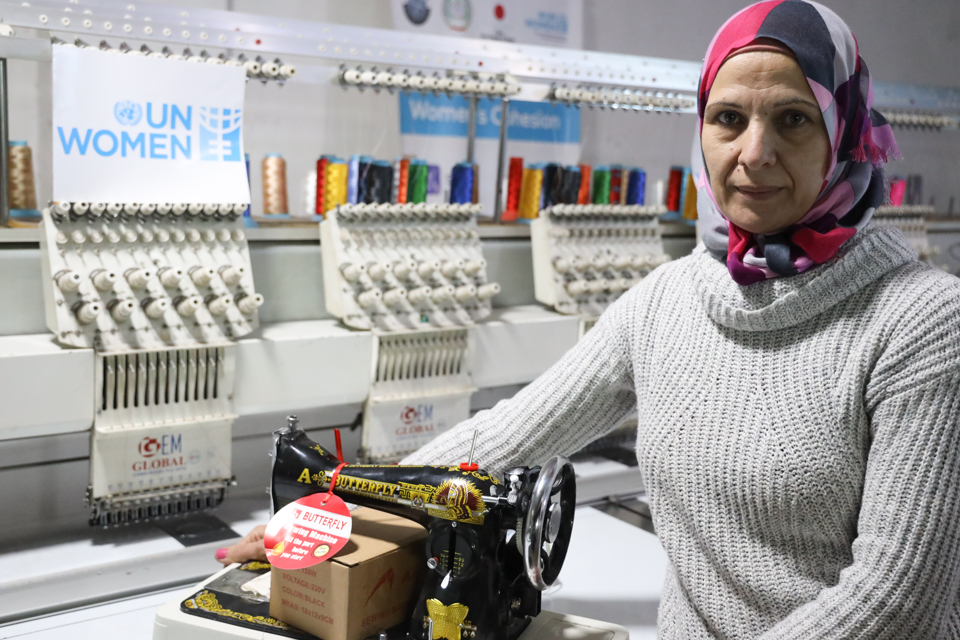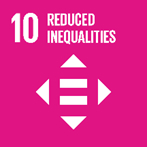From where I stand: ‘The training helped us to have the confidence to dream.’
Date:

Four years ago, Maysaa Bakri, mother of three, became the primary provider of her family when her husband, a construction worker, fell from a roof, hurt his back and lost almost all his vision.
“After my husband’s accident, I tried finding a job as a domestic worker, but I would often get sexually harassed or bullied. Then I changed jobs and started working at a clothing store in Tripoli. I resigned after less than a year because my employer always made me feel uncomfortable. The day I told him I wanted to leave the job, he tried to sexually assault me. Thankfully, I was able to stop him. Before this incident, I texted him, when he was away in Turkey, because I wanted to buy a few items from the store that I would pay him once he was back, which I did. Nine months later, he accused me of stealing a pair of leggings from the store. I was arrested and imprisoned for seven months. As, he had a restraining order against me, I was not allowed after my release, to work anywhere near the area of the clothing store.
My family was distraught. During my imprisonment, life at home really deteriorated; my children started scavenging for food from trash bins so they could sleep at night. It was especially difficult for my husband because of all the rumors that started circulating about me in our community. People started trying to convince my husband that I did not go to prison for theft but rather for prostitution and plant doubts in his head – I had to show him the legal papers to make him believe me.
After my release, I was too scared to apply for jobs because I knew my judicial record was tainted. I was still able to cook and clean other people’s homes, but the money was not enough to sustain my family. I was desperately looking for a new opportunity, and that is when I heard about the sewing training by Al Jamhiyaa al Loubnaniya Al Khairiya lil Islaah Wal Taahil.
I have always loved sewing but never had the chance to build my skills. Both my mom and sister are tailors, so I already had a little background when I joined this training. Waking up early every day to go to the workshop, gave me the opportunity to get out of the house and see the world.
Both the psychosocial support and the sewing training were life changing. Through the workshop, I made friends who did not judge me for my past; we would all arrive early and eat breakfast together. We supported each other throughout the learning process, from sewing zippers to buttons and dresses. The psychosocial support included group sessions with mentors where participants talked about previous experiences and learned about social communication and ways to face the world. The training helped us to have the confidence to dream and explore projects that in the past we would never have thought we can achieve.
Towards the end of the training, I started taking requests for shortening sleeves and adding zippers. When the training ended, I was awarded my own sewing machine. I can now take on more clients and perform more complex assignments. I charge 3000 LBP for every tailoring task, which is the price of a bread bag; it may not sound like much, but if that is enough for my family to eat, I am grateful.
This training made me love myself and love my work. I feel like I can control my stress better amid this economic crisis, and I am hopeful. Before coming here, I lost hope in everything, but being here has helped me grow and find a reason to live again.”
Maysaa joined a UN Women programme catering to current and former female inmates in Lebanon, conducted in partnership with Tripoli-based NGO Al Jamhiyaa al Loubnaniya Al Khairiya lil Islaah Wal Taahil (The Philanthropic Lebanese Association for Reform and Rehabilitation) and made possible by the generous support of the Government of Japan.
The programme supports the rehabilitation of prisoners, and their transition from prison back into society. It includes psychosocial support sessions as well as skills-based training in sewing, and cooking. At the end of the six-month training, trainees were provided with assets to enable them to start their own businesses.
This UN Women programme supports current and former female inmates in Lebanon to enter the labor force amidst the economic crisis in Lebanon, which has seen women’s unemployment rate rise from 14.3 per cent before the crisis to 26 per cent by September 2020, according to a recent brief by UN Women.
Maysaa’s story illustrates the importance of achieving Sustainable Development Goal (SDG) 5 on gender equality and the empowerment of women; and SDG 10, which calls for reducing inequalities in income as well as those based on age, sex, disability, race, ethnicity, origin, religion or economic or other status.
